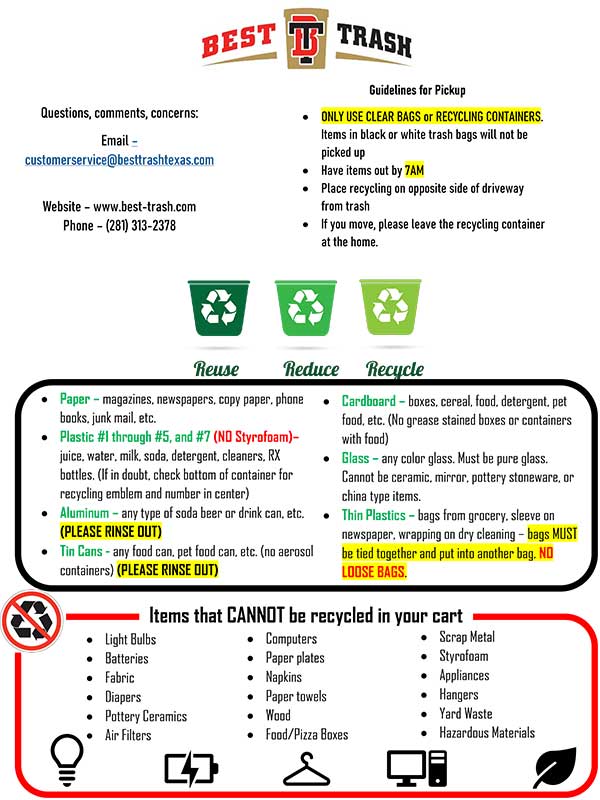Latest News Archives
Recycling Service
Harris County MUD 364 recently entered into a contract with Best Trash to provide recycling service to all residential customers. Here is information residents need to know about the new service:
Will recycling bins be provided?
- Yes – Best Trash plans to begin delivering 18- gallon recycling bins to all HC MUD 364 residents on Monday, August 1, 2022.
When will recycling be picked up?
- Best Trash will pick up recycling once a week on Fridays. The first pick up will be Friday, August 5, 2022.
- For Stillwater Area residents pick up is on Wednesdays.
What if I already receive recycling service through another provider?
- The services provided by the District are separate from any arrangement residents may have with another recycling/trash provider. Residents should determine how to cancel any separate arrangement they have.
What is the cost for the recycling service?
- Residents will be billed $4.50 on their monthly water bill.
What can I recycle?
- Below is a list of all items that can be recycled.
Where can I get more information?
- Website: www.best-trash.com
Email: customerservice@besttrashtexas.com
Phone: 281-313-2378

Water Conservation
NOTICE: District Response to Drought Conditions in Houston Area
Due to current drought conditions in the Houston area, the District requests that all customers immediately begin implementing the following actions:
- Limit irrigation to no more than two (2) days per week, between 7:00 p.m. and 5:00 a.m. following the schedules below:
- Sundays and Thursdays for single family residential customers with even-numbered street addresses.
- Saturdays and Wednesdays for single family residential customers with odd-numbered street addresses.
- Tuesdays and Fridays for all other customers.
- No watering on Mondays. Check for and repair all leaks, dripping faucets, and running toilets.
- Utilize water conservation measures such as displacement bags, low-flow shower heads and leak detection tablets.
- Additional water conservation tips can be found at https://wateru.nhcrwa.com and www.irrygator.com.
For more information on drought conditions in the area and voluntary water conservation measures being implemented by the North Harris County Regional Water Authority, please visit: https://www.nhcrwa.com/nhcrwa-stage-1-dcp/